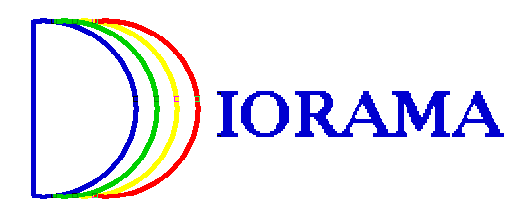
W
e l c o m e to DIOM project home page

DIOM - Distributed Interoperable Object Model
The goal of the DIOM project is to develop an adaptive methodology and toolkits for
intelligent integration and access of heterogeneous information sources in large-scale and
rapidly growing enterprise-wide networking environments (such as the Internet). The
information sources can either be structured data repositories (like databases) or
semi-structured data (e.g., www pages, news articles) or unstructured data (such as text
or binary files). The Diorama system consists of several components that
extract properties from unstructured data or collect data through other information
brokers/mediators, and dynamically convert and assemble gathered information into DIOM objects.
DIOM is an acronym for Distributed Interoperable Object Model, which is developed as an extension to ODMG object model. The objectives of the DIOM development are to facilitate Internet users to integrate, combine, and manage data extracted from autonomous and yet heterogeneous information sources. It promotes the support of the USECA properties: Uniform access user interface to its components, Scalability to the larger networks, adaptability to system Evolution, Composability of interface designs and client/server components, and full respect of Autonomy.
To address the research issues presented by such systems, we introduce the Distributed Interoperable Object Model (DIOM). DIOM s main features include:
the mechanisms for explicitly capturing source-specific query capabilities information through the semi-automatic construction of DIOM base interfaces;
the use of interface abstraction mechanisms (such as specialization, generalization, aggregation and import) to support incremental design and construction of compound interoperation interfaces, which allows the seamless incorporation of the growing number of incoming information sources and provides the DIOM consumers with scalable and continuous services;
the deferment of source-specific representational and semantic conflict resolution to the query processing time instead of requiring an integrated global view schema; and
the systematic development of adaptive query mediation architecture, which consists of the most basic and necessary distributed query services such as query routing, query decomposition, parallel access planning, subquery submission, subquery result packaging, and global result assembly.
the adaptive, on-the-fly restructuring of complex query plans to cope with unexpected unavailability of the information sources or delays of wide-area networks.
The Diorama/DIOM adopts the mediator-based framework (see I3 Reference Architecture). The Diorama mediator architecture is still evolving at the moment.
Feel free to use the following tools that have been developed or under development. Your suggestions and comments may send directly to lingliu@cc.gatech.edu or disl@cc.gatech.edu
![]()
ATTENTION:
Currently some of our tools are under revision and some are under development. Please return to this page for updates. Thank you.
![]() NetNews Monitoring
NetNews Monitoring
![]() Harvest Change Notification
Service
Harvest Change Notification
Service
Project Members
Faculty
Dr. Ling Liu, Associate Professor.
Dr. Calton Pu, Professor.
Students
Dave Buttler, Ph.D. Student
Wei Tang, Ph.D. Student.
Tong Zhou, PhD Candidate.
Past members
John Biggs, Research Programmer.
Dheeraj Madadi, Graduate Student.
Yoo-Shin Lee, Graduate Student.
Kirill Richine, Graduate Student.
Karim Makhani
Uwe Thiemann, Visiting Researcher.
![]() The
XWrap Project
The
XWrap Project
![]() The
Query Router Project
The
Query Router Project
![]() The
CQ/Continual Queries Project
The
CQ/Continual Queries Project
![]() The
Heterodyne Project
The
Heterodyne Project
![]() The
ActivityFlow/TAM Project
The
ActivityFlow/TAM Project
![]() The
Synthetix Project
The
Synthetix Project
![]() The
ESR Project
The
ESR Project
GaTech
Distributed Data Intensive Systems Lab